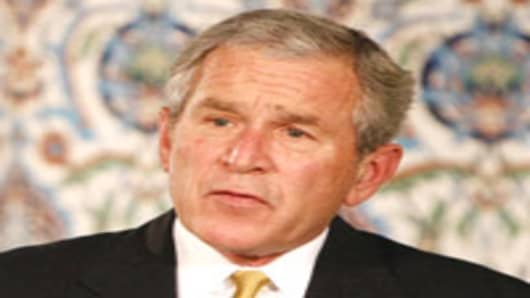President Bush said Sunday he would sign a $152 billion package on Wednesday that is aimed at keeping the world's largest economy out of recession with tax rebates and investment incentives.
Citing private sector economists, Bush said he did not believe the U.S. economy was in recession despite an implosion in the housing market, a widening credit crunch and, for the first time in 53 months, a loss of jobs in January.
"I will be signing this bill Wednesday," Bush said in an interview on Fox News Sunday.
Asked whether he would consider further action if the economy continued to sputter, Bush said: "We just have to play it by ear."
Beyond prompting fears of a global ripple effect, the health of the U.S. economy has become a key campaign issue for Republican and Democratic candidates seeking to contest November's presidential election to succeed Bush.
Finance officials from the Group of Seven industrial nations said this weekend that while the U.S. economy was likely to escape a recession in 2008 and economic fundamentals remained "solid," far more work was needed to restore financial markets to good working order and safeguard global growth.
The G7 ministers pointed to serious risks from the U.S. property market slump and subsequent tightening of credit conditions, which has slowed the flow of money to the consumers and companies that drive the world's economy.
"The current financial turmoil is serious and persisting," U.S. Treasury Secretary Henry Paulson said as the G7 finance leaders laid out plans to treat the root causes of market distress at a meeting in Tokyo.
""As the financial markets recover from this period of stress, as of course they will, we should expect continued volatility as risk is re-priced."
Bush Warns Congress
Some Democrats have talked about offering a second measure aimed at providing more aid to the economy but Bush warned Congress against going too far to adopt regulations that could constrain businesses and the economy.
"That's why I was so supportive of this current package, because it was temporary," Bush said.
After a brief spat over the size of the stimulus package, the Senate and House agreed Thursday to a measure that would provide one-time rebates of up to $600 for individuals, $1,200 for couples and $300 for each child.
Low-income people, including retirees on Social Security and disabled veterans who pay no income taxes, would receive checks of $300.
The checks could be in the mail within months. Some economists have said that while the measures will buy time, they may not be enough to avert recession.


